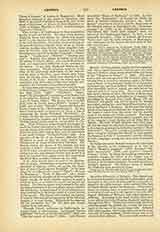
Jacques Lefevre D’etaples
French philosopher, biblical and patristic scholar, b. at Etaples in Picardy, about 1455; d. at Nerac, 1536

Lefevre d’Etaples, JACQUES, frequently called Faber Stapulensis, a French philosopher, biblical and patristic scholar, b. at Etaples in Picardy, about 1455; d. at Nerac, 1536. He pursued his classical studies at the University of Paris, graduating as master of arts. In 1492 he made a journey to Italy. His protracted visits to Florence, Rome, and Venice were devoted chiefly to the study of the works of Aristotle. On his return to Paris he displayed considerable activity as professor in the college of Cardinal Lemoine. Among his disciples were the Protestant reformer Farel and the later bishops Briconnet, Roussel, D’Arande, Poncher. In 1507 he was invited to the monastery of St. Germain-des-Pres near Paris, by the abbot Briconnet. Here he resided till 1520, assiduously studying the Bible. The first-fruit of his labors was his “Psalterium Quintuplex, gallicum, romanum, hebraicum, vetus, conciliatum” (Paris, 1509). In 1517 and 1519 he published at Paris two critical essays on Mary Magdalen, “De Maria Magdalena” and “De tribus et unica Magdalena disceptatio secunda” In these writings he endeavored to prove that Mary, sister of Lazarus, Mary Magdalen, and the penitent woman who anointed Christ’s feet (Luke, vii, 37) were three distinct persons. This opinion, new at the time, gave rise to a violent controversy; refutations by Noel Bedier, syndic of the University of Paris, and John Fisher, the martyr-Bishop of Rochester, appeared; they were followed by the condemnation by the Sorbonne in 1521. The preceding year, Lefevre had left Paris for Meaux, where his friend, Briconnet, now bishop of this city, was to appoint him his vicar-general in.1523. He continued his bibilical studies, publishing the “Commentarii initiatorii in quatuor Evangelia” (Paris, 1522); a French translation of the New Testament (Paris, 1523), and of the Psalms (Paris, 1525); an explanation of the Sunday Epistles and Gospels (Meaux, 1525). As these works contained some erroneous views and revealed the author’s sympathies for the doctrines of the so-called reformers, they again brought him into conflict with the Sorbonne. His commentary on the Gospels was condemned in 1523, and only the timely interposition of the king shielded him temporarily from further molestation. But during the captivity of Francis I, which followed the battle of Pavia (February, 1525), further proceedings were instituted against Lefevre for his novel doctrines and he sought safety in flight. After the king’s release, he was recalled from exile and appointed librarian in the royal castle of Blois (1526). Here he worked at his translation of the Old Testament, which appeared at Antwerp in 1528. In 1531, he accompanied Marguerite, Queen of Navarre, to Nerac, where he spent the last years of his life. Lefevre was a strong advocate of ecclesiatical reforms but did not deem a separation from the Catholic Church, of which he always remained a member, necessary for the attainment of this end. Among his non-biblical writings the following may be mentioned: “Theologia vivificans, Dionysii coelestis hierarchia, Ignatii XV epistolae, Polycarpi epistolae” (Paris, 1498); “Opera complura St. Hilarii episcopi” (Paris, 1510); “Liber trium virorum Hermae, Uguetini et Roberti triumque spiritualium virginum Hildegardis, Elizabethae et Mechtildis” (Paris, 1513).
N. A. WEBER

